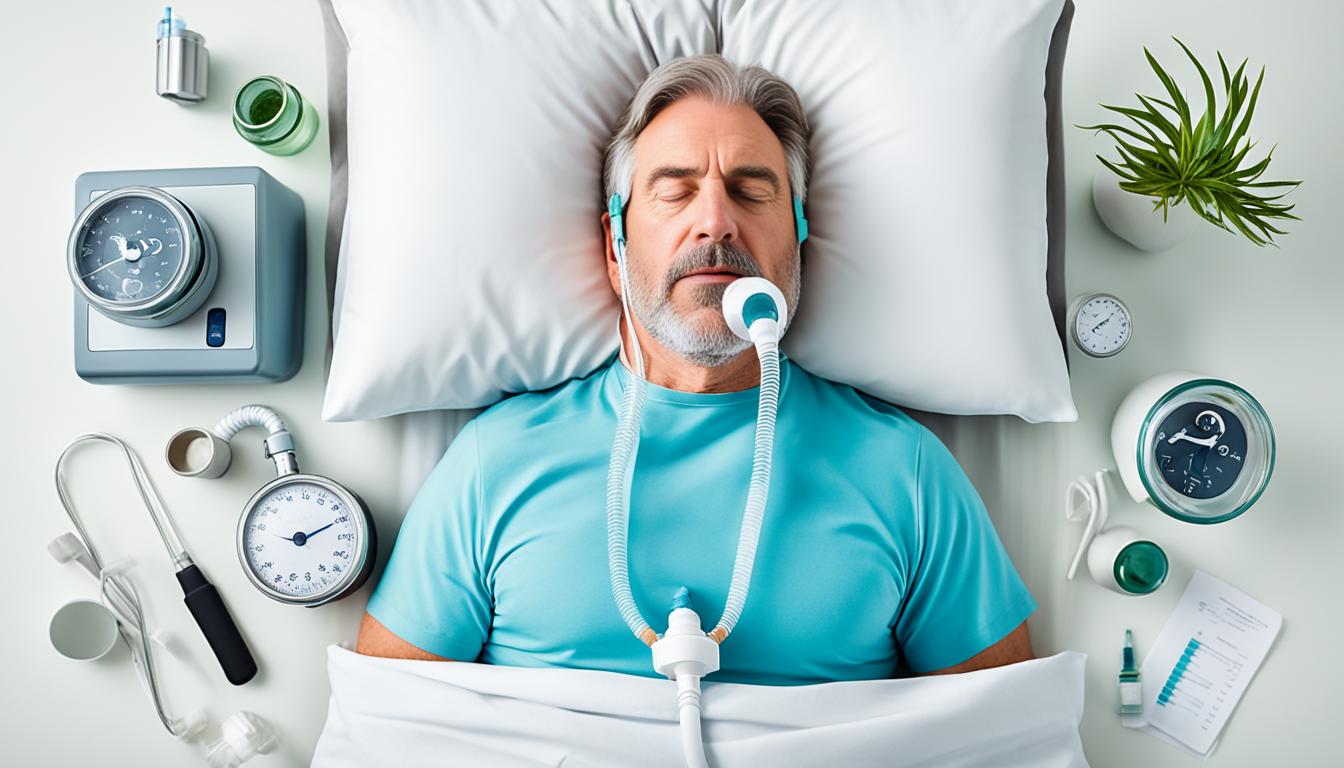Central sleep apnea is a sleep disorder that affects how you breathe while sleeping. It’s not like obstructive sleep apnea where something is physically blocking your airway. In central sleep apnea, the brain pauses on sending signals to the breathing muscles from time to time. This condition might be linked to serious health issues. These could include brainstem problems, stroke, or use of certain drugs. It can also happen without a clear reason or be related to living in high altitudes. People with central sleep apnea might pause their breathing, feel tired all the time, want to sleep during the day, wake up with headaches, and toss and turn at night.
A test called polysomnography can help find central sleep apnea. It watches over brain waves, eye movement, muscle activity, and how you breathe while asleep. How to treat central sleep apnea depends on what causes it. This can be improving other medical conditions, using a special machine called CPAP, or even taking certain medicines. Sometimes, doctors might suggest using stem cell therapy for a very advanced kind of treatment.
Key Takeaways:
- Central sleep apnea is a sleep disorder that makes you breathe irregularly when asleep.
- The brain pauses sending messages to the muscles that help you breathe, unlike obstructive sleep apnea.
- Its signs include temporarily stopping breathing, feeling worn out, wanting to sleep during the day, waking up with headaches, and having trouble sleeping.
- A sleep study called polysomnography is used to diagnose central sleep apnea.
- Treating it involves what’s causing it, like dealing with other health issues, using CPAP machines, or medications to help breathe.
- In complex cases, stem cell therapy might be an option for treating central sleep apnea.
Causes and Risk Factors of Central Sleep Apnea
Central sleep apnea has many causes and risk factors. These often link to issues in the brainstem. This can include brain infections and strokes. Even problems in the spinal cord can play a part. Certain drugs, like some painkillers, may also lead to this condition.
Living at high altitudes, above 8,000 feet, is another risk. It’s because lower oxygen levels can change how we breathe. Some people get central sleep apnea without any clear cause.
Age and gender matter, too. It’s more common in older adults, especially over 65. Men face a higher risk of central and another type called obstructive sleep apnea.
Health issues like heart failure and Parkinson’s disease can also be linked to central sleep apnea. So can strokes and problems with the kidneys.
Summary Table: Causes and Risk Factors of Central Sleep Apnea
| Causes | Risk Factors |
|---|---|
| Brain infections | Age (over 65) |
| Strokes | Male gender |
| Conditions impacting the cervical spine | Heart failure |
| Narcotic painkillers | Parkinson’s disease |
| Exposure to high altitudes | Severe kidney disease or kidney failure |
| Idiopathic central sleep apnea |
Central sleep apnea can start from many different factors. Brainstem issues, strokes, and certain drugs are some causes. Living in high altitudes and some health conditions can also lead to it. Understanding and treating these causes is key in handling central sleep apnea effectively.
Diagnosis and Management of Central Sleep Apnea
Telling if someone has central sleep apnea needs a detailed checkup. The main test is polysomnography, a sleep study. It looks at many things like brain and muscle activity, heart rate, and how you breathe. This helps doctors see how often you stop breathing and how bad it is.
Other tests might be done to find health issues linked to central sleep apnea. You could have an echocardiogram to check your heart or lung tests. Sometimes, an MRI shows if anything’s wrong with your brain or breathing system.
After being diagnosed, treating central sleep apnea is key. This depends on what’s causing it. If heart problems are involved, those get the most attention. Stopping certain medications might also improve things. And treatment for breathing issues can help a lot.
Devices like CPAP, BiPAP, and ASV machines can make breathing more regular. They all help keep your airways open and steady air flow.
Sometimes medicine, like acetazolamide or theophylline, can help too.
Another option is oxygen therapy to keep your blood oxygen levels up during sleep.
Treatment Options for Central Sleep Apnea:
| Treatment Option | Description |
|---|---|
| Continuous Positive Airway Pressure (CPAP) | Delivers a constant flow of pressurized air to keep the airway open |
| Bilevel Positive Airway Pressure (BiPAP) | Provides different levels of pressure during inhalation and exhalation |
| Adaptive Servo-Ventilation (ASV) | Delivers pressure support based on the patient’s breathing pattern |
| Medications | Help stimulate breathing, such as acetazolamide or theophylline |
| Oxygen Treatment | Ensures adequate oxygen levels during sleep |
| Remede System | Implanted device that stimulates the breathing muscles’ nerve |
If other treatments don’t work, the Remede System might be an option. It’s a device put in your chest that helps the breathing muscles work better.
Getting the right diagnosis and treatment for central sleep apnea can really improve life quality.
Conclusion
Central sleep apnea is a type of sleep disorder that causes breathing to stop during sleep. It can link to serious health issues, like brainstem problems, stroke, or the use of certain drugs. But, people can get better with the right diagnosis and care.
People with idiopathic central sleep apnea often have a good prognosis, even if the cause is unknown. Addressing the main health issue is key to prevent future complications. It’s important to see a doctor for a proper check-up, the right tests, and a plan that fits your needs.
Finding and treating the causes of central sleep apnea can lead to better sleep and health. Seeking medical guidance is crucial for managing this condition and improving your sleep.

